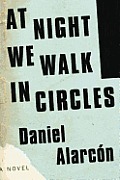 It’s been a while since I read Daniel Alarcon’s fantastic War by Candlelight and Lost City Radio, seeing an occasional something from him in The New Yorker or elsewhere and wondering when the next big one was coming. I was passing by my favorite neighborhood bookstore a couple of weeks ago, and, lo! A window full of At Night We Walk in Circles, along with a notice about a soon-to-come reading by my favorite local author.
It’s been a while since I read Daniel Alarcon’s fantastic War by Candlelight and Lost City Radio, seeing an occasional something from him in The New Yorker or elsewhere and wondering when the next big one was coming. I was passing by my favorite neighborhood bookstore a couple of weeks ago, and, lo! A window full of At Night We Walk in Circles, along with a notice about a soon-to-come reading by my favorite local author.
I presented myself at the affair early enough to buy a copy and grab a seat near the front and was well-rewarded for my diligence. Not only did Alarcon provide a terrific intro to the book itself but a fascinating story or two about its creation. I hadn’t seen anything from him because this novel was years and years aborning. He thought he’d finished it in 2010, he said, though he wasn’t all that happy with it. He decided to show it to a couple of friends with the expectation that they might say he was being too hard on himself. But no. They confirmed his negativity, and he dumped all but about ten pages and started over. He described as well his chilling experiences as an instructor in the brutal Peruvian prison system, a location that is crucial to the book. Finally, in response to a question, he went into his personal life as a Spanish/English/American/Peruvian. That might have been the best part of the talk. Every part of his identity is organic. There’s no split. I envy him that. He sets his stories in an unnamed country because he wants complete freedom to roam, to invent characters,  locations, events, without being tied to the real world. He was born in Peru, moved to Birmingham (Alabama, not England) with his doctor parents early on, spoke Spanish at home, when to an accelerated high school. And there he is, and here is At Night We Walk in Circles.
locations, events, without being tied to the real world. He was born in Peru, moved to Birmingham (Alabama, not England) with his doctor parents early on, spoke Spanish at home, when to an accelerated high school. And there he is, and here is At Night We Walk in Circles.
First thing to remember is that this is a novel with a narrator telling the stories of the main characters. Like all such novels, the characters operate as vehicles of the narrator’s imagination. Gatsby, for example, is a creation of Nick Carraway. The second thing to remember is that this is a book about the theater. In the 1980’s, Henry, the founder/leader/playwright of Diciembre is tossed into prison for writing and performing a play called The Idiot President. In 2001, he’s out of prison and driving a cab. Since these are less censorious times, he lets himself get talked into reviving the play and taking on a tour of the provinces–villages scattered along the Andes, mainly. Enter young Nelson, a devotee of Henry’s, who ends up being cast in a central role, and off the troupe goes.
Near the beginning, we’re given to understand that something happens to Nelson on this tour, but we’re not told what. We’re also not told who the narrator is. Alarcon claims that he himself didn’t decide until very late in the game who the storyteller is. Whatever the truth of the matter, these twin mysteries pull us through the action like a needle pulling a thread through fabric. When will the “it” happen? What will it be?
In the meantime, we move from town to town in almost picaresque fashion, meeting new characters and circumstances as we go, and experiencing the characters getting to know each other, dealing with their pasts, with the people and places they’ve left behind in the city, and watching how their performances of the intriguing play shape their attitudes and their characters.
It would be giving far too much away to reveal what does happen to Nelson, but suffice it to say, it’s a theatrical even that breaks through that fourth wall into an entirely separate reality. Alarcon manages the complex whole with a fine-tuned ear for irony, humor, and pathos. I have no idea what was on all those pages he tossed in 2010, but what’s between the 2013 covers of At Night We Walk In Circles, is a painful and exhilarating literary experience.
